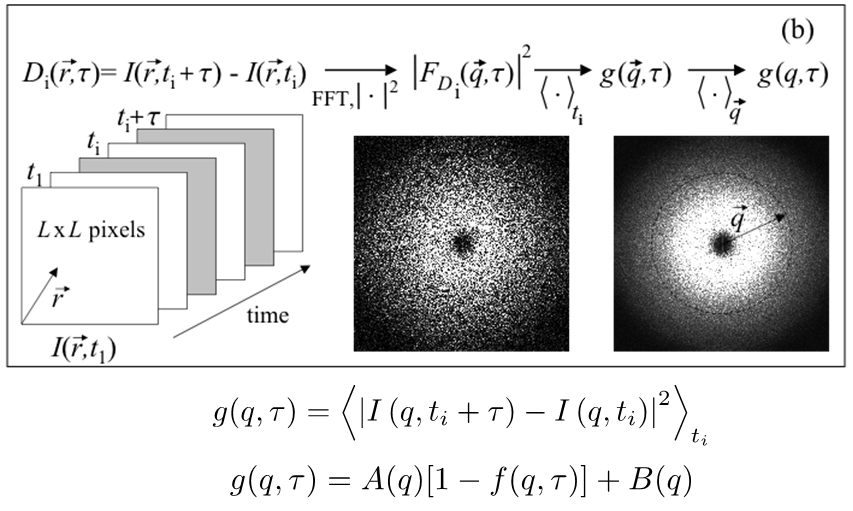Differential Dynamic Microscopy (UEDIN)
Light microscopy
Description
Differential dynamic microscopy (DDM) is a fairly new fast high-throughput technique to measure the dynamics of soft materials. DDM provides similar information to light scattering experiments, but works on a wider range of samples including very turbid samples that cannot be easily probed using other techniques. The experimental soft matter group at Edinburgh is one of the pioneers in this technique, applying it to a wide range of functional soft materials, including active systems.
The technique
DDM analyses is based on time series of microscopy images of the sample which is used to calculate the differential image correlation function g(q, tau). Under appropriate imaging conditions and for isotropic motion, g(q, τ) is related to the intermediate scattering function f(q, tau), which is the q th Fourier component of the density temporal autocorrelation function, well known from dynamic light scattering.

Simple scaling analysis of the characterisitic time scale can provide basic characterisation of the dynamics, but in many cases suitable models for f(q, tau) are known, making highly quantitative analysis possible.
The image series used for DDM can be recorded using a wide variety of contrast mechanisms, including phase contrast, fluorescence or dark field microscopy. Unlike particle tracking, DDM does not necessarily need to resolve individual particles and can therefore work with relatively low magnification images. This allows monitoring larger parts of the sample and can thus easily achieve very good statistics.
Available instrumentation and resources
Several dedicated experimental work stations to acquire raw data for DDM analysis are available, typically allowing automated data acquisition for up to 8 samples. A selection of cameras ensures that a wide range of frame rates is available while providing enough sensitivity to monitor even weakly fluorescent samples. Furthermore, the work stations can be easily adapted to provide special samples environments such as temperature control or external fields. A range of proprietary software tools to process and analyse DDM data is available, together with world leading expertise in interpreting the data.
Local Contacts
- Dr. Vincent Martinez
- Dr. Jochen Arlt
